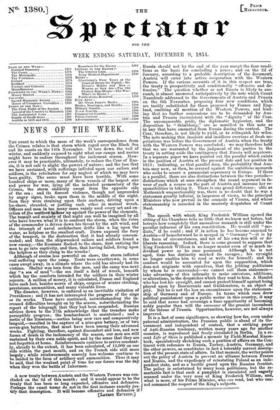A. new treaty between Austria and the Western Powers was
concluded on the 2d of this month ; and it would appear to be the treaty that has been so long expected, offensive and defensive. Perhaps the exact terms do not in the first instance exactly justify that description. It will become offensive and defensive if Russia should not by the end of the year accept the four conditions as the basis for concluding a peace ; and on the 2d of January, according to a probable description of the document, Austria will enter into active cooperation with the Western Powers. If the various accounts of it in this respect are true, the treaty is prospectively and conditionally "offensive and defensive." The question whether or not Russia is likely to succumb, is almost answered anticipatively by the note which Count Nesselrode addressed to the Governments of Austria and Prussia on the 6th November' proposing four new conditions, which are tacitly substituted for those proposed by France and England, omitting all mention of the Western Powers, and hinting that no further concessions are to be demanded by Austria and Prussia inconsistent with the " dignity " of the Czar. The unconquerable pride, the diplomatic hypocrisy, and the disposition to " thimblerig," are as manifest in this note as in any that have emanated from Russia during the contest. The Czar, therefore, is not likely to yield, or to relinquish his wiles. The note making this insolent and insidious overture at fresh negotiations was before the Government of Austria when the treaty with the Western Powers was concluded ; we may therefore hold that we are warranted by the judgment of the parties to the treaty in setting aside the contingency that Russia will acquiesce. In a separate paper we have pointed out the parallel which exists in the position of Austria at the present date and her position in 1813; indicating, as that parallel does, the probability that Austria may now, as then, be arrayed against the ambitious monarch who seeks to secure a paramount supremacy in Europe. If there is a parallel, there are also distinctions between the two periods— distinctions which at once strengthen the sound argument in favour of such a course on the part of Austria and increase her re
sponsibilities in taking it. There is one grand difference : able as Metternich unquestionably was, there is no doubt that he was a
statesman greatly inferior, in largeness of views, to the principal Ministers who now prevail in the councils of Vienna, and whose statesmanship is recorded in the masterly despatches of Count B uol.
























